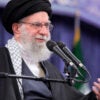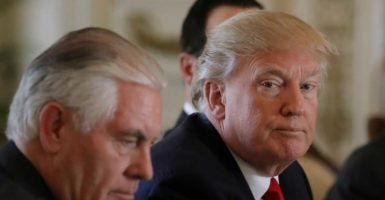The defining foreign policy decision of President Donald Trump’s first 100 days is a significant shift from his noninterventionist rhetoric on the campaign trail in facing down Syrian dictator Bashar Assad.
“I am flexible and I’m proud of that flexibility,” @POTUS says.
Republican Sens. John McCain of Arizona and Lindsey Graham of South Carolina, longtime critics of the president, praised Trump’s decision to launch 59 Tomahawk missiles at the Syrian government’s Shayrat airfield, where a chemical weapons attack was launched that killed more than 70 Syrian civilians, including children.
Conversely, Republican Sens. Rand Paul of Kentucky and Mike Lee of Utah stressed that Trump should have sought congressional approval before the strikes. Meanwhile, conservative talk radio host Laura Ingraham noted the major policy shift.
Missiles flying. Rubio’s happy. McCain ecstatic. Hillary’s on board. A complete policy change in 48 hrs.
— Laura Ingraham (@IngrahamAngle) April 7, 2017
While some Trump supporters on the pundit side might have been surprised by the strikes, it’s not likely to hurt the president with his supporters throughout the country, said Richard Benedetto, an adjunct professor of government at American University.
“Some Trump folks will be disappointed,” Benedetto told The Daily Signal. “Many of the so-called blue-collar Trump supporters backed him because they did not like to see America get pushed around.”
As a candidate, Trump heavily criticized George W. Bush, a former president of his own party, for launching the Iraq War, while in 2013, he tweeted that President Barack Obama shouldn’t intervene in Syria.
President Obama, do not attack Syria. There is no upside and tremendous downside. Save your “powder” for another (and more important) day!
— Donald J. Trump (@realDonaldTrump) September 7, 2013
This doesn’t necessarily mean Trump has shifted away from a cautious attitude toward foreign entanglements, said Benedetto, a former White House correspondent for USA Today.
“He could still be a noninterventionist compared to Bush, but at the same time, wants to make it clear he is not Obama,” Benedetto said. “It doesn’t mean he will be an interventionist in other things. But this means he takes chemical weapons seriously and he believes he had to do something.”
During a Rose Garden press conference Wednesday, the president telegraphed a shift before the strike, stating he is flexible.
I don’t have to have one specific way, and if the world changes, I go the same way … I do change and I am flexible and I’m proud of that flexibility, and I will tell you that attack on children yesterday had a big impact on me, big impact. That was a horrible, horrible thing and I’ve been watching it and seeing it, and it doesn’t get any worse than that. And I have that flexibility and it’s very, very possible, and I will tell you it’s already happened that my attitude toward Syria and Assad has changed very much.
The New York Times ran a story with the headline “Trump’s Far-Right Supporters Turn on Him Over Syria Strike.” However, the story focused mostly on more extreme elements rather than the general Trump supporter or conservatives.
The expectations of Trump as a “restrictionist, realist, or isolationist” during the presidential campaign were miscalculated from the beginning, said Emma Ashford, a research fellow for defense and foreign policy at the libertarian Cato Institute.
“He talked in the campaign about staying out of stupid Middle East wars, but he also talked about Iraq and how we should have taken their oil, and how he would bomb the hell out of ISIS,” Ashford told The Daily Signal. “People tend to focus on whether he is a neocon or like Ron or Rand Paul. They ignore the third way, which is being a restrictionist on humanitarian matters but interventionist in other areas.”
Ashford noted that military presence in the Middle East has increased since Trump became president.
Ashford said that Obama’s decision not to strike Syria in 2013 was sound.
“It worked in that Assad did not use chemical weapons again while Obama was president,” Ashford said.
The change between campaign rhetoric and international affairs isn’t unusual for presidents. Woodrow Wilson campaigned on staying out of World War I. Franklin Roosevelt campaigned on staying out of World War II. Richard Nixon campaigned on exiting the Vietnam War, and George W. Bush shunned nation building, experts said.
“Campaign rhetoric is just designed to get votes,” James Carafano, a national security expert at The Heritage Foundation, told The Daily Signal. “Look at John McCain and Barack Obama in 2008, and they sounded almost identical. There was no way anyone could have predicted Barack Obama’s foreign policy over the next eight years.”
He continued that this is what one should expect from Trump as a businessman.
“This is who Trump is. He deals with what he is dealt,” Carafano said. “If profits are down, he doesn’t hold a press conference to pretend they are not. He deals with it.”































One Reply to “Trump’s First Big Foreign Policy Move a Departure From Stump Speeches”